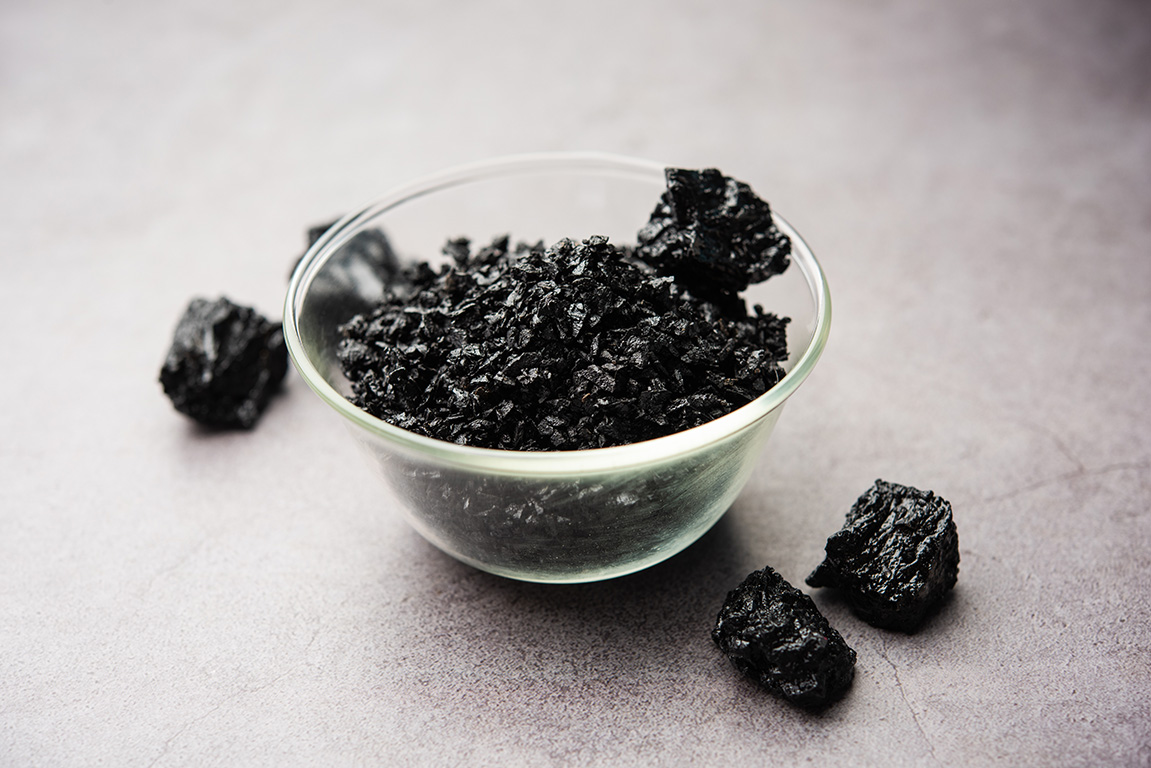Shilajit, a common ingredient in Ayurvedic medicine, is primarily found in the Himalayan mountains. Over centuries, plant decomposition gradually formed Shilajit. People often refer to Shilajit as tar-like or a resin due to its very dark (black-brown) color and high viscosity. Unlike either tar or resin, Shilajit is readily soluble in water but insoluble in ethanol.
Shilajit, which translates to “Conqueror of Mountains” and “Destroyer of Weakness” in Sanskrit, contains 60% to 80% humic and fulvic acids. The mineral and trace mineral content ranges from 15% to 20%. It’s rich in minerals, amino acids, and 85+ trace minerals, with potassium, calcium, and magnesium being the most prevalent.
Benefits of Shilajit
Shilajit may prevent or slow Alzheimer’s disease
The progressive brain disorder Alzheimer’s disease causes problems with memory, behavior, and a person’s ability to think. There are drug treatments available to improve Alzheimer’s symptoms. Some researchers believe that Shilajit may prevent or slow the progression of Alzheimer’s.
A primary component known as fulvic acid is a powerful antioxidant. Tau proteins, an important part of your nervous system, can build up, causing damage to brain cells. Some researchers believe Shilajit may contribute to cognitive health by preventing the accumulation of Tau proteins and potentially improving Alzheimer’s symptoms.
https://www.ncbi.nlm.nih.gov/pmc/articles/PMC3296184
https://pubmed.ncbi.nlm.nih.gov/23131823
Suffering from Chronic Fatigue Syndrome
Causing extreme tiredness and fatigue, Chronic Fatigue Syndrome (CFS) is a long-term condition that can make everyday activities extremely challenging. Shilajit may boost your body’s mitochondrial function and may help to improve energy levels. Lab rats were given Shilajit for 3 weeks. Then forced to swim for 15 minutes for 21 consecutive days. The results showed that Shilajit helped reduce CFS effects.
May Help with Low Iron – Anemia
Fatigue, weakness, headaches, or an irregular heartbeat can be the symptoms of iron deficiency anemia. Hemoglobin, red blood cells, and hematocrit are vital components of your blood. Similarly, iron deficiency causes a reduced concentration of myoglobin in the muscles, commonly leading to weakness and poor physical endurance. Study results suggest that Shilajit is safe for long-term use as a dietary supplement for multiple disorders, like iron deficiency anemia.
Could Increase Testosterone
Testosterone, the main hormone involved in male sex, varies in men’s levels. Low testosterone symptoms include decreased libido, hair loss, decreased muscular mass, exhaustion, and increased body fat.
Half of the patients in clinical research involving male volunteers aged 45 to 55 received a placebo, while the other half received a dosage of 250 mg of pure shilajit twice a day.
The study discovered that after taking pure shilajit for 90 straight days, the testosterone levels of those who received the supplement were considerably greater than those of the placebo group.
https://pubmed.ncbi.nlm.nih.gov/26395129
Encourage heart health
Shilajit supplementation may also aid heart health. On lab rats, researchers examined the heart function of shilajit. Researchers pretreated some rats with shilajit and then injected them with isoproterenol to cause cardiac damage. Rats who received shilajit before suffering a heart injury had fewer cardiac lesions, according to a study. If you have an active cardiac condition, you should avoid using shilajit.
This herb is natural and considered safe and it is possible to be allergic to this supplement. You should never consume raw or unprocessed shilajit. Raw shilajit may contain numerous contaminants, like heavy metals, free radicals, and fungus, that can cause illness. Whether you buy shilajit online or from a natural or health food store, ensure that it is purified and ready for use.
The U.S. Food and Drug Administration doesn’t monitor shilajit for quality, purity, or strength because it’s considered a herbal approach to health. Carefully research your options for where to purchase it and choose a reputable source.
Don’t take shilajit if you have sickle cell anemia, hemochromatosis (too much iron in your blood), or thalassemia. Stop taking Shilajit if you develop a rash, increased heart rate, or dizziness.
https://www.ncbi.nlm.nih.gov/pmc/articles/PMC3609271/
Purchase Purified Organic Shilajit Here
